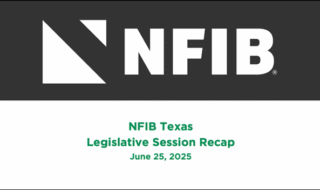April 12, 2025
Multi-billion-dollar transportation package taking shape
State Director Anthony Smith reports from Salem on the small business agenda for the legislative week ending April 11
It’s Day 81 of the 160-day 2025 Oregon Legislative Session and that means we have officially made it to the half-way point! That’s good news in and of itself, coupled with the fact that the playing field has narrowed considerably with the passing of the April 9th First Chamber bill deadline, which we touched on in our last update.
NFIB is now tracking just 196 bills. Originally, we were keeping tabs on several hundred more. Many on our current tracking list are bills assigned to legislative committees not bound by deadlines (revenue, rules, joint committees, etc.) but unfortunately, many of them are bills that should have already failed to move forward. Bills like HB 2548 and HB 3838, which would establish industry specific labor standards boards, were moved to the House Committee on Rules in order to stay alive. Bills like HB 2746 (wage and benefit disclosure mandate) and HB 2688 (prevailing wage for off-site work) were moved to the Joint Committee on Ways and Means, where they will be weighed against many other competing funding priorities.
Only a handful of big-ticket items have made it through to the Second Chamber already, so we’re well-positioned to fight hard over the next few weeks as we approach the next major legislative deadlines – May 9th to post a work session and May 23rd for the work session vote to occur.
NFIB Small Business Day, April 23
NFIB’s Small Business Day event is Wednesday, April 23rd this year, so if you’re interested in a specific bill, you want to meet other NFIB members and staff, or you’re just curious to learn more about the legislative process and hear directly from state legislators, we would invite you join us!
The event is free to attend and includes lunch, but advance registration is required.
Multi-Billion-Dollar Transportation Tax Package Takes Shape
On April 3rd, the Oregon Legislature’s Joint Committee on Transportation Co-Chairs Sen. Chris Gorsek (D-Gresham) and Rep. Susan McLain (D-Forest Grove) released a much anticipated framework for the Oregon Transportation ReInvestment Program (TRIP), which would raise nearly $2 billion in new taxes and fees per biennium, including:
- A 20-cent increase to the state’s current 40-cents per gallon gas tax, phased in over the next seven years and indexed to inflation thereafter
- A new 1% sales tax on new and used cars
- A new road usage charge for electric vehicles and highly fuel-efficient vehicles
- A new charge for delivery vehicles used by companies like Amazon. FedEx, and UPS
- An additional $66 on Oregon vehicle registration fees
- An additional $90 to vehicle titling fees
- Increasing the state’s weight-mile tax on heavy vehicles by 16.9%
- A new 3% sales tax on tires
- An increase (0.5% to 0.8%) on the “privilege” tax paid by auto dealers on new car sales
- A $9.50 increase to the existing $15 tax on sales of new bicycles sold for $200 or more
- An increase (0.1% to 0.18%) on the statewide transit payroll tax that all workers in Oregon pay
The proposal is ambitious to say the least. Considering ODOT’s recent budgeting mistakes that overestimated agency revenues by more than $1 billion and the fact that many of the projects that were promised to Oregonians eight years ago, when the last major transportation package was passed by the legislature, have not yet been completed, Oregonians have a right to be skeptical of a big ask for more money.
House Republican Leader Rep. Christine Drazan (R-Canby) minced no words in a written response to the proposal, “The Democrats’ tone-deaf proposal throws more money at a system that has repeatedly failed to recognize that its core mission is to provide safe and reliable roads and bridges. A dozen new taxes and fees is a slap in the face to all Oregonians that simply can’t afford to pay more for less.”
If you’d like to read more about this proposal, check out this article from OPB’s Dirk VanderHart.
Property Owner & Construction Contractor Liability Update
In what is shaping up to be (arguably) the worst bill of the entire 2025 legislative session, SB 426 passed the Senate by a vote of 18-11 (with one senator excused) on April 9th and now heads over to the Oregon House of Representatives for further consideration.
If you’ve been checking your emails from NFIB (or poring over these updates), you already know that this bill would make property owners and general construction contractors liable for the unpaid wages of their subcontractors and would establish a presumption that, in any action for unpaid wages, a person performing labor on a construction project is an employee rather than an independent contractor.
The bill applies to non-union workers only, so if a property owner and/or business wants to avoid this new liability, their only choice is to hire union shops and avoid doing business with open shops.
NFIB issued a Small Business KEY VOTE alert for this measure, and it will almost certainly be included on NFIB’s next official Voting Record for Oregon. Here’s a link to our 2023-24 Voting Record, in case you’re interested and here’s an excerpt from the KEY VOTE alert:
As serious as the issue of unpaid wages is, and as much as we all want to go after the bad actors who take advantage of the system, the law must be even-handed. The state has an interest in both protecting workers, and those businesses that follow the law, which is why NFIB opposes SB 426 A.
This legislation would set a dangerous precedent by holding law-abiding businesses responsible for the illegal actions of other businesses, even in circumstances where there was no knowledge of illegal activity.
If this bill continues to move forward, and we expect it to, please be on the lookout for a another NFIB Action Alert email that will be directed toward members of the Oregon House of Representatives.
And to all the NFIB members out there who took the time to write to your state senators on this issue, thank you! We love it when we walk into a legislator’s office and they already know what we want to talk about, because they are getting emails from their constituents back home. It really makes an impact!
Plaintiffs Lawyers Are Using Your Own Tax Dollars Against You
A bill that hasn’t been getting much attention, but is extremely troubling is HB 2957, which would considerably expand a worker’s window to sue their employer following an investigation of a complaint by the Oregon Bureau of Labor and Industries (BOLI).
Currently, Oregon’s workplace discrimination laws are enforceable via private right of action or the BOLI complaint process. The employee gets to make the choice. If they choose to file a lawsuit, the statute of limitations is five years, but they and/or their attorney will bear the cost of investigating all the relevant circumstances of the case.
On the other hand, if they choose to file with BOLI, the employee still has five years to submit the complaint, and Oregon taxpayers bear the cost of the investigation (which can take up to one year). If BOLI dismisses the case, the employee and their attorney maintain access to the agency’s investigatory findings, and may use them in a legal proceeding, so long as they file in court within 90 days of the date on the notice from BOLI.
HB 2597 would eliminate that 90-day window to sue, meaning the employee would have any and all time remining on the five-year statute of limitations to file a lawsuit.
Few small businesses in Oregon have the resources or bandwidth to defend themselves against a BOLI investigation for up to a year and then remain prepared for litigation that may be filed up to five years later. The BOLI process should not be further utilized as a taxpayer-funded fact-finding agency for private sector law firms.
NFIB issued a Small Business KEY VOTE alert on this bill. It passed the House April 2nd on a party line vote.
Prior Legislative Reports
— March 21: Bills Look to Incentivize Litigation, End At-Will Employment
— March 8: NFIB Testifies for Bill Correcting UI Tax Trap
— February 14: Bad Age-Discrimination Bill Resurfaces. Flurry of Activity on Estate Tax
— February 1: Oregon Legislators Begin Work on 2,500 Bills
NFIB is a member-driven organization advocating on behalf of small and independent businesses nationwide.
Related Articles














